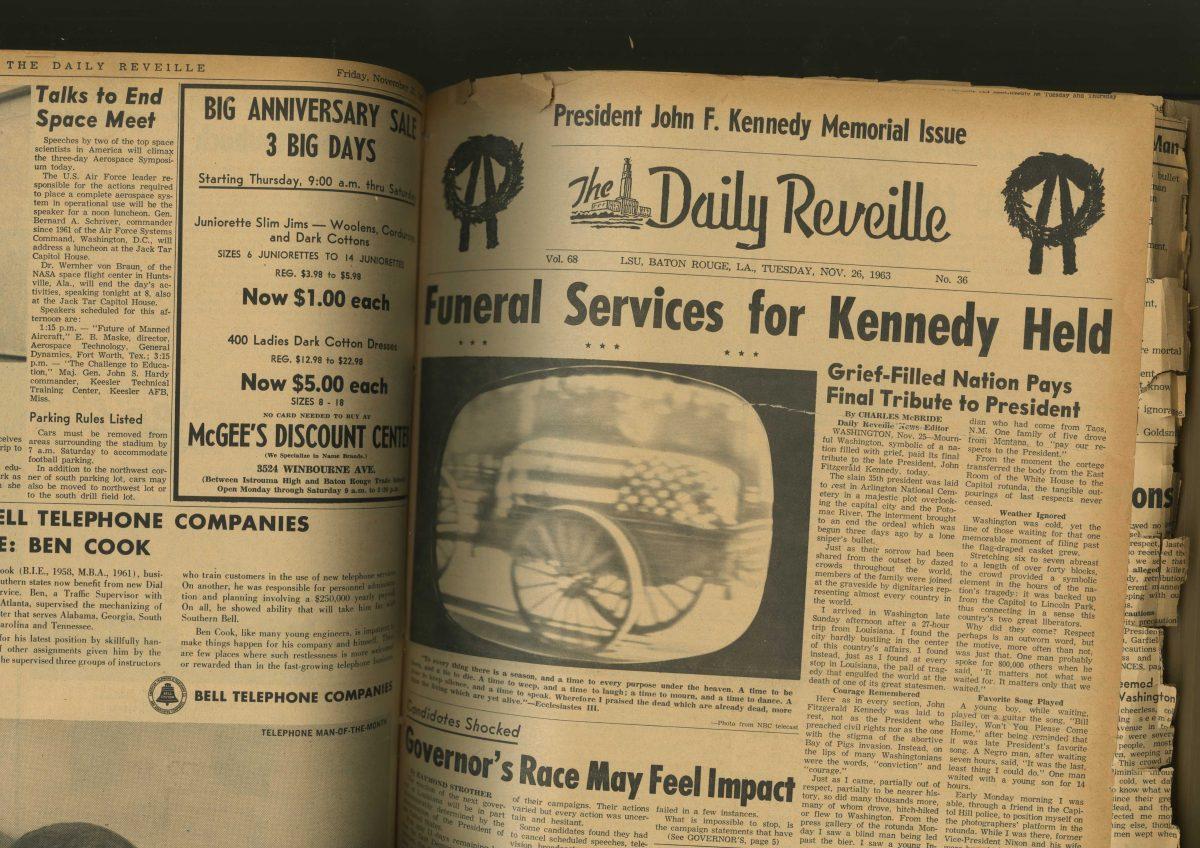Editor’s Note: This article was written in 1963 and contains vernacular from the time period. It is not a representation of views held by The Daily Reveille.
WASHINGTON, NOV. 25, 1963 — Mournful Washington, symbolic of a nation filled with grief, paid its final tribute to the late President, John Fitzgerald Kennedy, today.
The slain 35th president was laid to rest in Arlington National Cemetery in a majestic plot overlooking the capitol city and the Potomac River. The interment brought to an end the ordeal which was begun three days ago by a lone sniper’s bullet.
Just as their sorrow had been shared from the outset by dazed crowds throughout the world, members of the family were joined at the graveside by dignitaries representing almost every country in the world.
I arrieved in Washington late Sunday afternoon after a 27-hour trip from Louisiana. I found the city hardly bustling in the center of this country’s affairs. I found instead, just as I found at every stop in Louisiana, the pall of tragedy that engulfed the world at the death of one of its great statesmen.
Courage Remembered
Here as in every section, John Fitzgerald Kennedy was laid to rest, not as the President who preached civil rights nor as the one with the stigma of the abortive Bay of Pigs invasion. Instead, on the lips of many Washingtonians were the words, “conviction” and “courage.”
Just as I came, partially out of respect, partially to be nearer history, so did many thousands more, may of whom drove, hitch-hiked or flew to Washington. From the press gallery of the rotunda Monday I saw a blind man being led past the bier. I saw a young Indian who had come from Taos, N.M. One family of five drome from Montana to “pay our respects to the President.”
From the moment the cortege transferred the body from the East Room of the White House to the Capitol rotunda, the tangible outpourings of last respects never ceased.
Weather Ignored
Washington was cold, yet the line of those waiting for that one memorable moment of filing past the flag-draped casket grew.
Stretching six to seven abreast to a length of over forty blocks, the crowd provided a symbolic element in the hours of the nation’s tragedy: it was backed up from the Capitol to Lincoln Park, thus connecting in a sense this country’s two great liberators.
Why did they come? Respect perhaps is an outworn word, but the motive, more often than not, was just that. One man probably spoke for 800,000 others when he said, “It matters not what we waited for. It matters only that we waited.”
Favorite Song Played
A young boy, while waiting, played on a guitar that song, “Bill Bailey, Won’t You Please Come Home,” after being reminded that it was late President’s favorite song. A Negro man, after waiting seven hours, said, “It was the last, least thing I could do.” One man waited with a young son for 14 hours.
Early Monday morning I was able through a friend in the Capitol Hill police, to position myself on the photographers’ platform in the rotunda. While I was there, former Vice-President Nixon and his wife were brought in to view the casket. Surrounded by photographers from every corner of the globe, I suddenly found myself standing next to the man who had broken the tragic news to the U.S. Senate. He leads the Senate page corps.
Mrs. Jacqueline Kennedy, who has become more than a symbol of beauty and elegance, through her composure in the face of great personal tragedy, appeared at the Capitol Monday morning to lead the transfer of the body back to the White House, then on to St. Matthew’s Cathedral for the funeral.
Cortege Stops
I was able to station myself at a vantage point on the curb directly across Pennsylvania Avenue from the executive mansion. The cortege — to this point the most moving ceremony of all — stopped at the White House only momentarily.
Then, flanked by Attorney General Robert Kennedy and U.S. Senator Edward Kennedy, the First Lady dramatically led the walking cortege to the cathedral. Behind her were the world’s great leaders. One of them, Gen. Charles deGaulle, was heavily surrounded by Secret Service men. He has escaped several assassination attempts.
Those who had held their tears made no effort to do so during the gloom-filled procession. I saw a young Negro girl burst into tears and crumple in her brother’s arms. A young wife had to wipe away tears to operate her camera. I passed a member of a special detachment of New York City police, his eyes reddened, and then he openly wept.
Pride Is Felt
I am not a flag-waver, not a super-patriot, but I felt — just as almost every other American felt at that moment — very proud that the flag draping the mahogany casket was mine.
Mrs. Kennedy made perhaps her most memorable single gesture while coming down the steps of the cathedral. While the band was playing and the body was being lifted back onto the caisson, she bent down to tell John, Jr. — or John-John — to salute. However, he could not comprehend the death of his father.
From the vault: grief-filled nation pays final tribute to president
November 21, 2013




